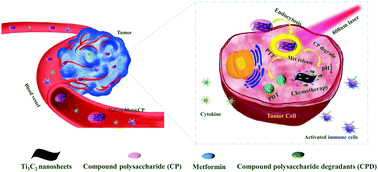Retracted Article: Surface modification engineering of two-dimensional titanium carbide for efficient synergistic multitherapy of breast cancer†
Abstract
Cancer is a leading cause of human mortality. Given that it is difficult for conventional therapeutic approaches to effectively eradicate tumors and inhibit their recurrence and metastasis, new therapeutic strategies for solving this problem are urgently needed. In this work, we report the development of a two-dimensional titanium carbide nanocomposite drug delivery system. The system can be used for the synergistic treatment of tumors through photothermal/photodynamic/chemotherapy and can also inhibit tumor recurrence and metastasis by activating the immune system. A surface modification engineering strategy has been elaborately designed to realize the multifunctionalization of an MXene, Ti3C2. In this strategy, the nanocomposite drug delivery system (Ti3C2@Met@CP) was established via layer by layer adsorption of metformin (Met) and compound polysaccharide (CP) on the surface of Ti3C2 nanosheets. Among these materials, the synthesized (AlOH)4−-functionalized Ti3C2 nanosheets possess strong near-infrared absorption (extinction coefficient of 36.2 L g−1 cm−1), high photothermal conversion efficiency (∼59.6%) and effective singlet oxygen generation (1O2). Compound polysaccharide (CP) is a new immunomodulator formed by mixing lentinan, pachymaran and tremella polysaccharides in optimal proportions. Especially, the decoration of CP onto the Ti3C2 nanosheets endows Ti3C2 with a well-defined shell, improves its tumor site aggregation and biocompatibility, and activates the host's immune functions. The synergistic eradication and inhibition of tumor recurrence and metastasis have been systematically evaluated by in vivo and in vitro experiments.



 Please wait while we load your content...
Please wait while we load your content...